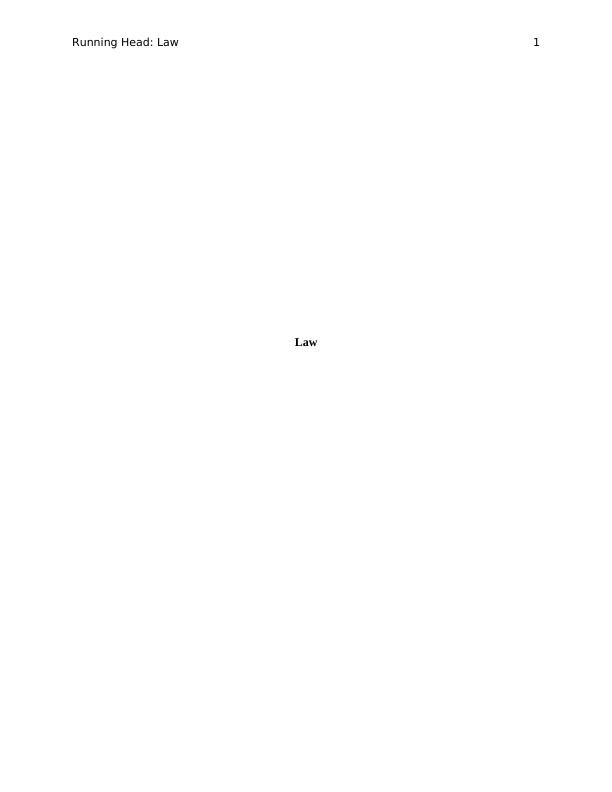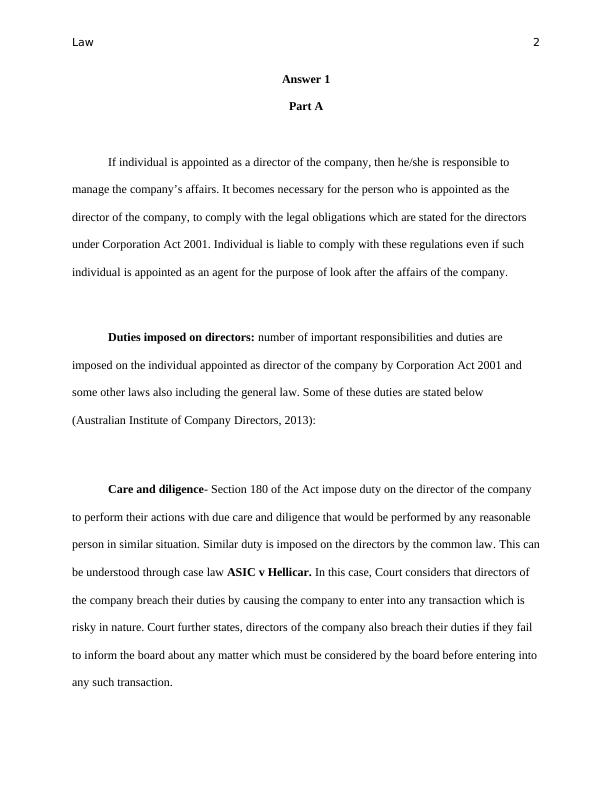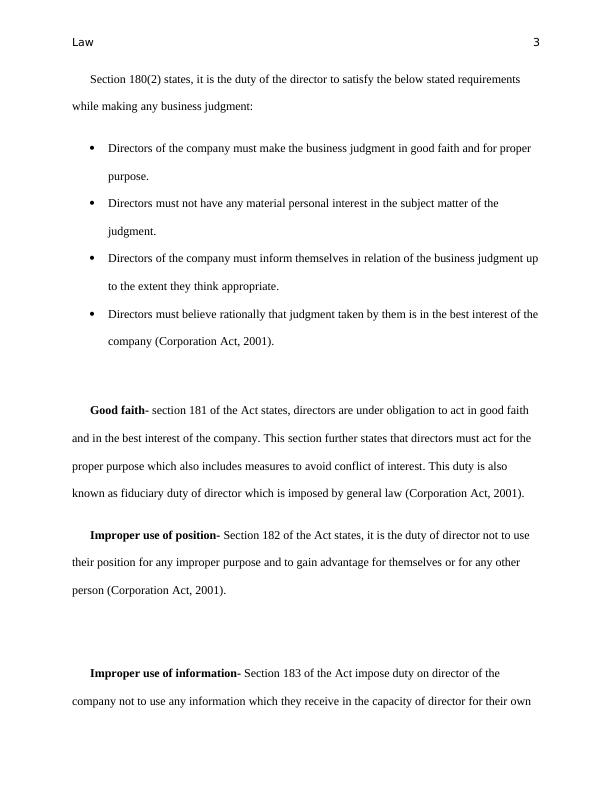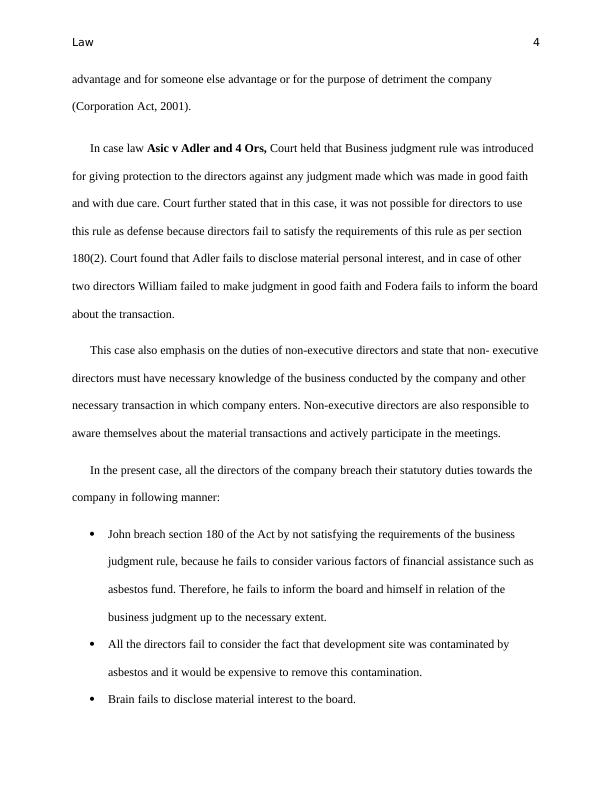The Company by Corporation Act 2001
11 Pages2496 Words59 Views
Added on 2020-02-24
The Company by Corporation Act 2001
Added on 2020-02-24
ShareRelated Documents
Running Head: Law 1
Law
Law

Law 2
Answer 1
Part A
If individual is appointed as a director of the company, then he/she is responsible to
manage the company’s affairs. It becomes necessary for the person who is appointed as the
director of the company, to comply with the legal obligations which are stated for the directors
under Corporation Act 2001. Individual is liable to comply with these regulations even if such
individual is appointed as an agent for the purpose of look after the affairs of the company.
Duties imposed on directors: number of important responsibilities and duties are
imposed on the individual appointed as director of the company by Corporation Act 2001 and
some other laws also including the general law. Some of these duties are stated below
(Australian Institute of Company Directors, 2013):
Care and diligence- Section 180 of the Act impose duty on the director of the company
to perform their actions with due care and diligence that would be performed by any reasonable
person in similar situation. Similar duty is imposed on the directors by the common law. This can
be understood through case law ASIC v Hellicar. In this case, Court considers that directors of
the company breach their duties by causing the company to enter into any transaction which is
risky in nature. Court further states, directors of the company also breach their duties if they fail
to inform the board about any matter which must be considered by the board before entering into
any such transaction.
Answer 1
Part A
If individual is appointed as a director of the company, then he/she is responsible to
manage the company’s affairs. It becomes necessary for the person who is appointed as the
director of the company, to comply with the legal obligations which are stated for the directors
under Corporation Act 2001. Individual is liable to comply with these regulations even if such
individual is appointed as an agent for the purpose of look after the affairs of the company.
Duties imposed on directors: number of important responsibilities and duties are
imposed on the individual appointed as director of the company by Corporation Act 2001 and
some other laws also including the general law. Some of these duties are stated below
(Australian Institute of Company Directors, 2013):
Care and diligence- Section 180 of the Act impose duty on the director of the company
to perform their actions with due care and diligence that would be performed by any reasonable
person in similar situation. Similar duty is imposed on the directors by the common law. This can
be understood through case law ASIC v Hellicar. In this case, Court considers that directors of
the company breach their duties by causing the company to enter into any transaction which is
risky in nature. Court further states, directors of the company also breach their duties if they fail
to inform the board about any matter which must be considered by the board before entering into
any such transaction.

Law 3
Section 180(2) states, it is the duty of the director to satisfy the below stated requirements
while making any business judgment:
Directors of the company must make the business judgment in good faith and for proper
purpose.
Directors must not have any material personal interest in the subject matter of the
judgment.
Directors of the company must inform themselves in relation of the business judgment up
to the extent they think appropriate.
Directors must believe rationally that judgment taken by them is in the best interest of the
company (Corporation Act, 2001).
Good faith- section 181 of the Act states, directors are under obligation to act in good faith
and in the best interest of the company. This section further states that directors must act for the
proper purpose which also includes measures to avoid conflict of interest. This duty is also
known as fiduciary duty of director which is imposed by general law (Corporation Act, 2001).
Improper use of position- Section 182 of the Act states, it is the duty of director not to use
their position for any improper purpose and to gain advantage for themselves or for any other
person (Corporation Act, 2001).
Improper use of information- Section 183 of the Act impose duty on director of the
company not to use any information which they receive in the capacity of director for their own
Section 180(2) states, it is the duty of the director to satisfy the below stated requirements
while making any business judgment:
Directors of the company must make the business judgment in good faith and for proper
purpose.
Directors must not have any material personal interest in the subject matter of the
judgment.
Directors of the company must inform themselves in relation of the business judgment up
to the extent they think appropriate.
Directors must believe rationally that judgment taken by them is in the best interest of the
company (Corporation Act, 2001).
Good faith- section 181 of the Act states, directors are under obligation to act in good faith
and in the best interest of the company. This section further states that directors must act for the
proper purpose which also includes measures to avoid conflict of interest. This duty is also
known as fiduciary duty of director which is imposed by general law (Corporation Act, 2001).
Improper use of position- Section 182 of the Act states, it is the duty of director not to use
their position for any improper purpose and to gain advantage for themselves or for any other
person (Corporation Act, 2001).
Improper use of information- Section 183 of the Act impose duty on director of the
company not to use any information which they receive in the capacity of director for their own

Law 4
advantage and for someone else advantage or for the purpose of detriment the company
(Corporation Act, 2001).
In case law Asic v Adler and 4 Ors, Court held that Business judgment rule was introduced
for giving protection to the directors against any judgment made which was made in good faith
and with due care. Court further stated that in this case, it was not possible for directors to use
this rule as defense because directors fail to satisfy the requirements of this rule as per section
180(2). Court found that Adler fails to disclose material personal interest, and in case of other
two directors William failed to make judgment in good faith and Fodera fails to inform the board
about the transaction.
This case also emphasis on the duties of non-executive directors and state that non- executive
directors must have necessary knowledge of the business conducted by the company and other
necessary transaction in which company enters. Non-executive directors are also responsible to
aware themselves about the material transactions and actively participate in the meetings.
In the present case, all the directors of the company breach their statutory duties towards the
company in following manner:
John breach section 180 of the Act by not satisfying the requirements of the business
judgment rule, because he fails to consider various factors of financial assistance such as
asbestos fund. Therefore, he fails to inform the board and himself in relation of the
business judgment up to the necessary extent.
All the directors fail to consider the fact that development site was contaminated by
asbestos and it would be expensive to remove this contamination.
Brain fails to disclose material interest to the board.
advantage and for someone else advantage or for the purpose of detriment the company
(Corporation Act, 2001).
In case law Asic v Adler and 4 Ors, Court held that Business judgment rule was introduced
for giving protection to the directors against any judgment made which was made in good faith
and with due care. Court further stated that in this case, it was not possible for directors to use
this rule as defense because directors fail to satisfy the requirements of this rule as per section
180(2). Court found that Adler fails to disclose material personal interest, and in case of other
two directors William failed to make judgment in good faith and Fodera fails to inform the board
about the transaction.
This case also emphasis on the duties of non-executive directors and state that non- executive
directors must have necessary knowledge of the business conducted by the company and other
necessary transaction in which company enters. Non-executive directors are also responsible to
aware themselves about the material transactions and actively participate in the meetings.
In the present case, all the directors of the company breach their statutory duties towards the
company in following manner:
John breach section 180 of the Act by not satisfying the requirements of the business
judgment rule, because he fails to consider various factors of financial assistance such as
asbestos fund. Therefore, he fails to inform the board and himself in relation of the
business judgment up to the necessary extent.
All the directors fail to consider the fact that development site was contaminated by
asbestos and it would be expensive to remove this contamination.
Brain fails to disclose material interest to the board.

End of preview
Want to access all the pages? Upload your documents or become a member.
Related Documents
Commercial Law Case Studies: Breach of Director's Dutieslg...
|9
|2938
|481
Legal Issues of Directors' Duties under Corporations Act, 2001lg...
|5
|938
|38
Corporate Law Case Studies: Breach of Director's Duties under Corporation Act 2001lg...
|11
|2987
|178
Business and Company Lawlg...
|14
|3394
|433
Business Laws Assignment (Solution)lg...
|15
|3314
|39
Corporation And Business Structure Assignmentlg...
|14
|4265
|116
